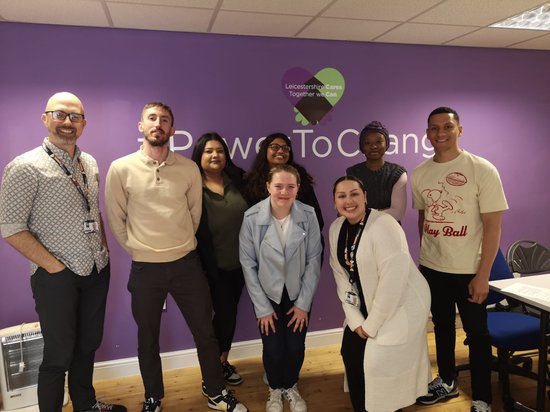What?
The Joining Up Joining In project hosted a consultation with University of Northampton's (UON) Access and Participation team to explore their current offer for students with care experience. Peer researchers on the project have lived experience of the care system and a number of those involved have navigated a journey through higher education. It was those experiences and insights that the team at UON were keen to hear and learn about to help improve and shape their offer moving forward led by Kahvan Bryan, Tim Dobson and Katrina Down.
I recently moved to a new gym! As I was finding my feet, I got talking to Aidan who works at Leicestershire Cares.
Part of my work involves supporting Care Experienced students and Aidan shared that his team work with Care Experienced young people who would love to be a soundboard for our ideas and provide us with an insight of their experiences in HE and beyond to help shape support that is relevant and impactful.
Tim Dobson, Katrina Down and I left the session full of admiration, ideas and commitment to stay in touch with the fantastic group of young people. If this sounds like something you’d be interested in, please do engage with Leicestershire Cares, they’re great!💪🏽
Kahvan Bryan, Access and Participation Manager, University of Northampton
So What?
Financial and Social Support
We explored UON's current offer and found that they offer considerably large financial rewards in comparison to De Montfort University the institution attended by peer researchers on the project. Peer researchers identified although there are some benefits to financial rewards this can also present challenges if it is the only package of support available. Peer researchers identified a range of other support avenues that they felt had helped during their transition into higher education.
Food Vouchers.
Peer Researchers
Financial support/ Budgeting workshops.
DMU transitions team (Designated professionals supporting CEYP and estranged students transition into the university environment.)
Extra-curricular activities, creating supportive communities and reducing social isolation.
Connecting with the local community and services that support marginalised groups.
Peer mentoring programmes.
A reduced financial reward could provide subsidies for trips for (CEYP) or estranged young people.
Local Authorities can support care leavers to pay accommodation, and for resources such as books.
Timely Payments.
Mental health support during holiday periods.
Early Support
UON shared information about their Bridging futures programme aimed at inspiring those of care experience between years 9 - 11 through their trailblazer's project and post 16 through their new horizon initiative.
Peer researchers shared the importance of engaging students of care experience in this initiative to act as positive role models to other young of care experience and to improve connection and engagement with the project.
Peer researchers
Communication, Placements and Careers
UON were keen to understand how care experienced students would like to receive communication and shared concerns around stigmatising or labelling students who didn't want to identify with being care experienced or estranged. They discussed wanting to create an even playing field for all students and making placements and career opportunities accessible for all. Peer researchers identified the following.
Improved communication could help, peer researchers discussed not wanting to be labelled but are happy to have choice.
Peer Researchers
Uni temps and careers teams have a lack of knowledge around supporting CEYP or estranged students Teams within current institution.
Placements can create financial challenge for CEYP needing to work. How can we afford to survive if placement isn’t paid?
Addressing Academic Pressures
The Access and Participation team provided some data relating to the number of care experience students withdrawing from their place at the UON in year 1. They shared that CEYP were more likely to withdraw due to academic failure compared to students who were not care experienced”.
Lack of awareness of external pressures faced such as lack of support from wider family unit, social isolation impacting on the mental health of many CEYP and other Social cultural factors (relationships with peers, support, tutor). Additionally, peer researchers shared the following could help to support CEYP. Extra days / deferral options, tailored to their needs, i.e. designated professionals, reduced academic jargon, more options relating to tuition methods.
Peer Researchers
Now What?
The UON have identified a commitment to creating an even playing field for students with care experience or those from estranged backgrounds. As part of this Kahvan and the team are committed to providing feedback to peer researchers over the coming months and will be bold in their attempts to impact change within their institution based on the insights and experiences provided by peer researchers on the Joining Up Joining In project. This may include an opportunity for peer researchers to provide or develop a training package aimed at improving the UON's current offer of support.
Get Involved
If you would like to hear more about our work with care experienced young people please get in touch.
Aidan Croughwell - Burton - Powering Up, Project Development Manager - aidan@leicestershirecares.co.uk
Should Care Experience be a Protected Characteristic | Leicestershire Cares
Joining Up Joining In- Councillor Deborah Taylor | Leicestershire Cares
